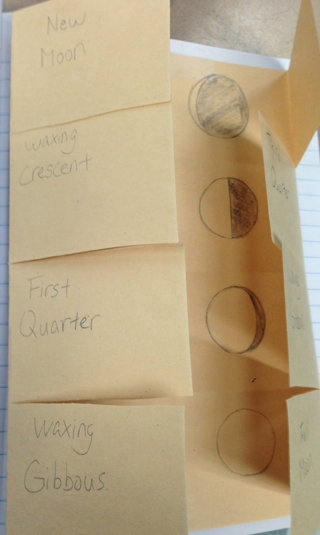Have you ever looked up at the night sky and thought the Moon was missing? Or that part of it had faded away? Don’t worry, it’s just a phase! Our Moon is Earth’s only natural satellite and, like other debris in our galaxy, it does not give off its own light. It’s dependent on the reflection of the Sun’s rays on its surface to light up in our night sky. When the Sun is on the other side of our planet, the Moon has no light and becomes a “New Moon,” but as we rotate around the Sun and the Moon rotates around us, the Sun lights up portions of the Moon until we see a fully lit “Full Moon.” Learn more about these phases and the phases between with this fun and easy foldable craft!
Materials:
- Construction Paper (any light color)
- Black Writing Utensil
- Scissors (Get an adult’s help!)
- Crayons or Markers (optional)
- Hole Punch (optional)
Activity:
Use the photo as your guide! Take your construction paper and fold it long-ways (hot dog style) equally into four sections. Use your scissors to carefully cut the outer sections into four equal folding panels. Draw each of the Moon phases listed below in the two center columns and put the corresponding phase name on the outer flaps. You can use your markers or crayons to get creative and draw the night sky around each Moon or use your hole punch to add it to your notebook for school. Quiz yourself on your Moon knowledge and see how well you do against your parents, friends and even teachers!
The moon has EIGHT (8) distinct phases.
Further Exploration:
- Go beyond our planet to explore the moons of Saturn, Jupiter, and other planets in our solar system! What do their phases look like?
- How many moons does each planet have? Is there a planet that doesn’t have any?
- Take it outside! If the night sky is clear, see if you can identify what phase the Moon is that evening. Track the Moon for a month to see if you can witness each phase!





